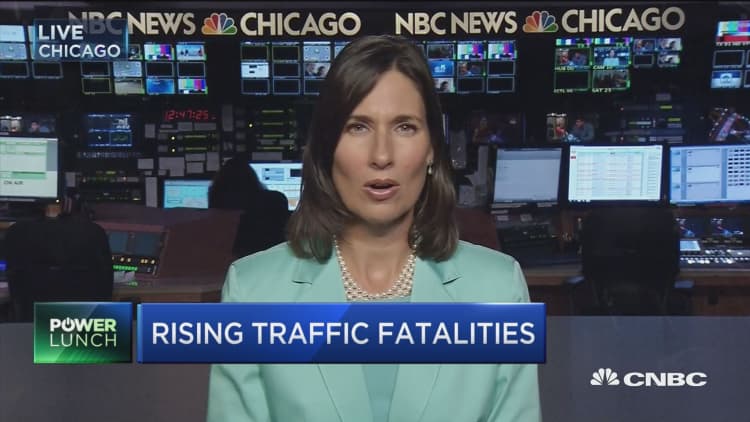Mobile phone use has made driving more dangerous.
Now some former standout engineers at Google and Facebook are using mobile phone data to try and make it safer.
What they're finding— by using artificial intelligence to analyze massive amounts of driver information— may radically change how auto insurance is priced.
Tech CEOs often start their companies to eliminate an obstacle they've encountered in their personal lives. Often called 'pain points' in Silicon Valley, two famous ones include Mark Zuckerberg wanting to meet more Harvard coeds and Travis Kalanick waiting too long for a ride.
But when Jonathan Matus reveals why he founded Zendrive, whose software is used to analyze driving behavior, the pain he talks about is more visceral.
"More people die in car accidents than in wars in
When he heard that statistic about his home country, Matus correctly deduced the reason: more drivers distracted by mobile phones.
It's the same in the U.S., where traffic fatalities are now going up after decades of decline. More than 40,000 Americans were killed in car accidents in 2016, a 14 percent rise since 2014, according to the National Safety Council.
That's the biggest two-year surge in five decades.
So Matus, who helped turn Google's Android into the world's dominant mobile software and later led the launch of Facebook's mobile platform, teamed up with another Google engineer, Pankaj Risbood, and in 2013 founded Zendrive.
"We can use smartphone data to save lives," Matus told CNBC in an interview.
A whole lotta data
Matus got his start in the smartphone world at Google in 2007, where he was a marketing manager for Android as it grew from nothing to the most popular mobile platform. Then he moved to Facebook, where he helped launch its mobile platform.
So Matus knows mobile. And when he talks about data, he means a whole lot of it.
As of this week, Zendrive has analyzed 15 billion miles of driving, captured through a variety of applications and hardware that commercial fleet owners use to track driver safety. Zendrive also has partnerships with consumer apps, including Life360 and HopSkipDrive, to collect information about how drivers with those apps are operating.
That 15 billion miles of analysis is more than Uber has, Matus claims, and almost as much as Progressive Insurance, which said last May it hit that same milestone — after nearly two decades of data collection.
Zendrive has also looked at crash data through partnerships with Ford and BMW. "We crashed hundreds of cars with BMW," Matus says.
After looking at all this data, Zendrive found that accidents are usually caused by four high-risk behaviors: speeding, hard braking, acceleration and phone use — a study Zendrive released last month showed that 88 percent of drivers are on their mobile phones while driving.

The company also found that "nearly all crashes are due to the worst 20 percent of drivers," according to Matus.
Now that data is making some insurance companies consider changing how they do business.
"The insurance industry has been more of a blunt instrument than a surgical one," says Scott Wollney, CEO of Atlas Financial Holdings, a leading insurer of light commercial vehicles.
Atlas is testing Zendrive's analytics package to see if it can improve its own predictive software, and seeing good results.
"The Zendrive data is extremely valuable," Wollney said in an email. The company wants to use it "to predict the cost of loss and help prevent accidents from happening."
Atlas is "confident" that Zendrive's driver-scoring methodology can help it identify high-risk drivers even before they have a crash.
"When we move into a production phase with their technology, we expect to pay for its use," Wollney says.
While Zendrive data is already of interest to insurance companies, it also has other applications.
Before the city of San Francisco closed parts of an often-congested stretch of Mission Street to all but buses and taxis, it had Zendrive study driver behavior there.
While that could turn into a market, Matus says, "it's an interesting business but not part of our revenue model right now."
Instead, the company, which now has 50 employees and has raised $16 million from venture capital firms including Sherpa Ventures, First Round
"Waze is focused on getting you there the fastest," Matus says, referring to the Israeli startup acquired by Google for $1.1 billion in 2013.
"We want to get you there the safest way."


